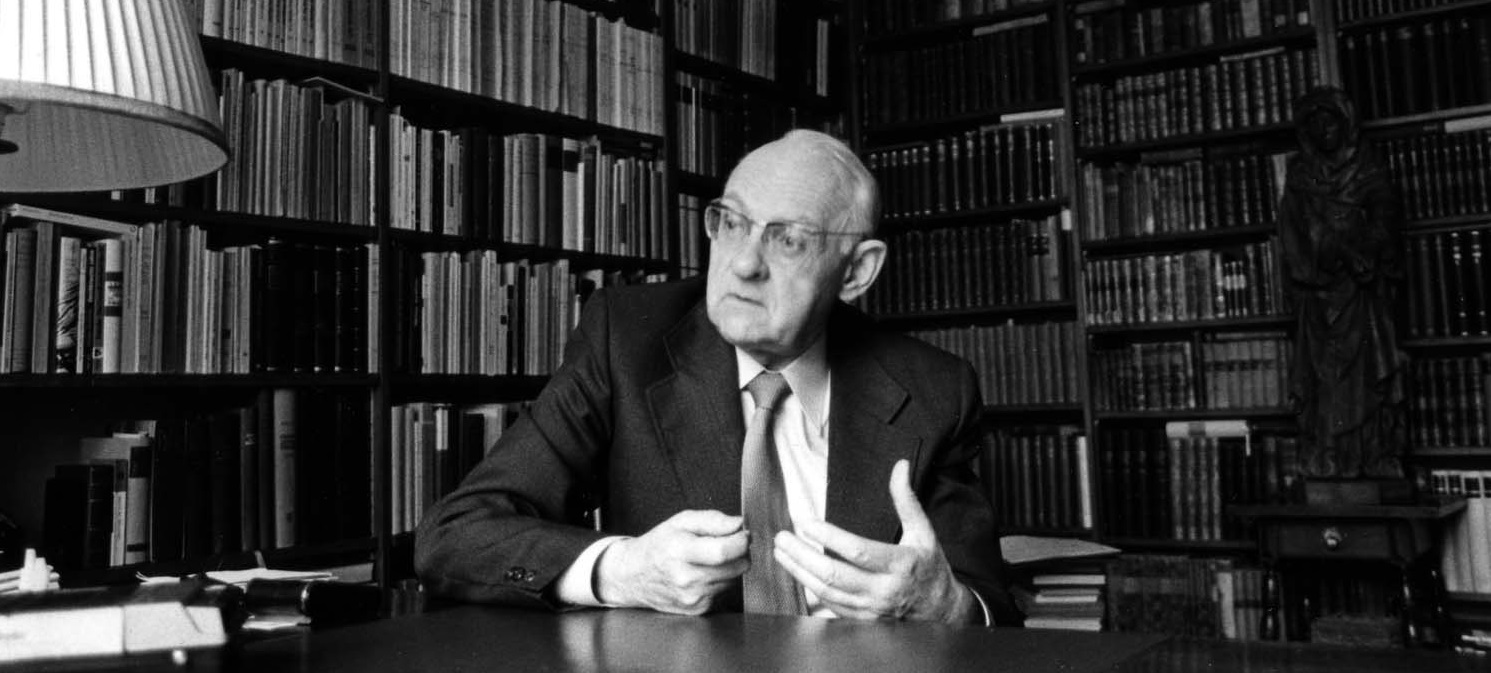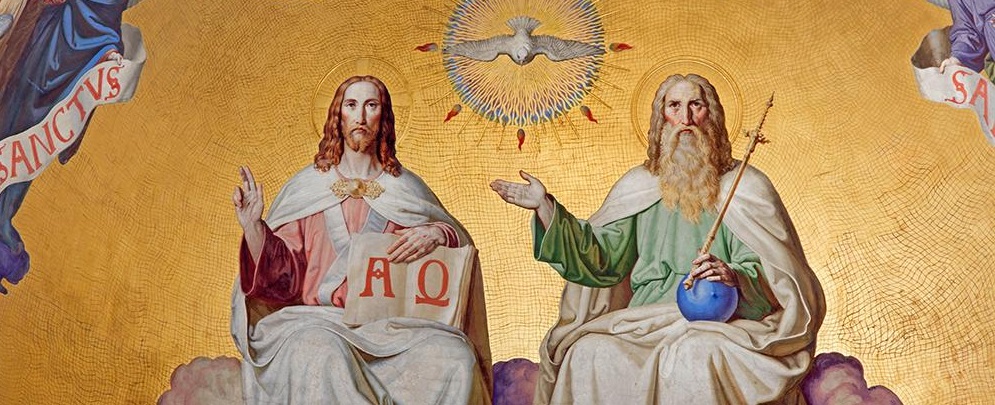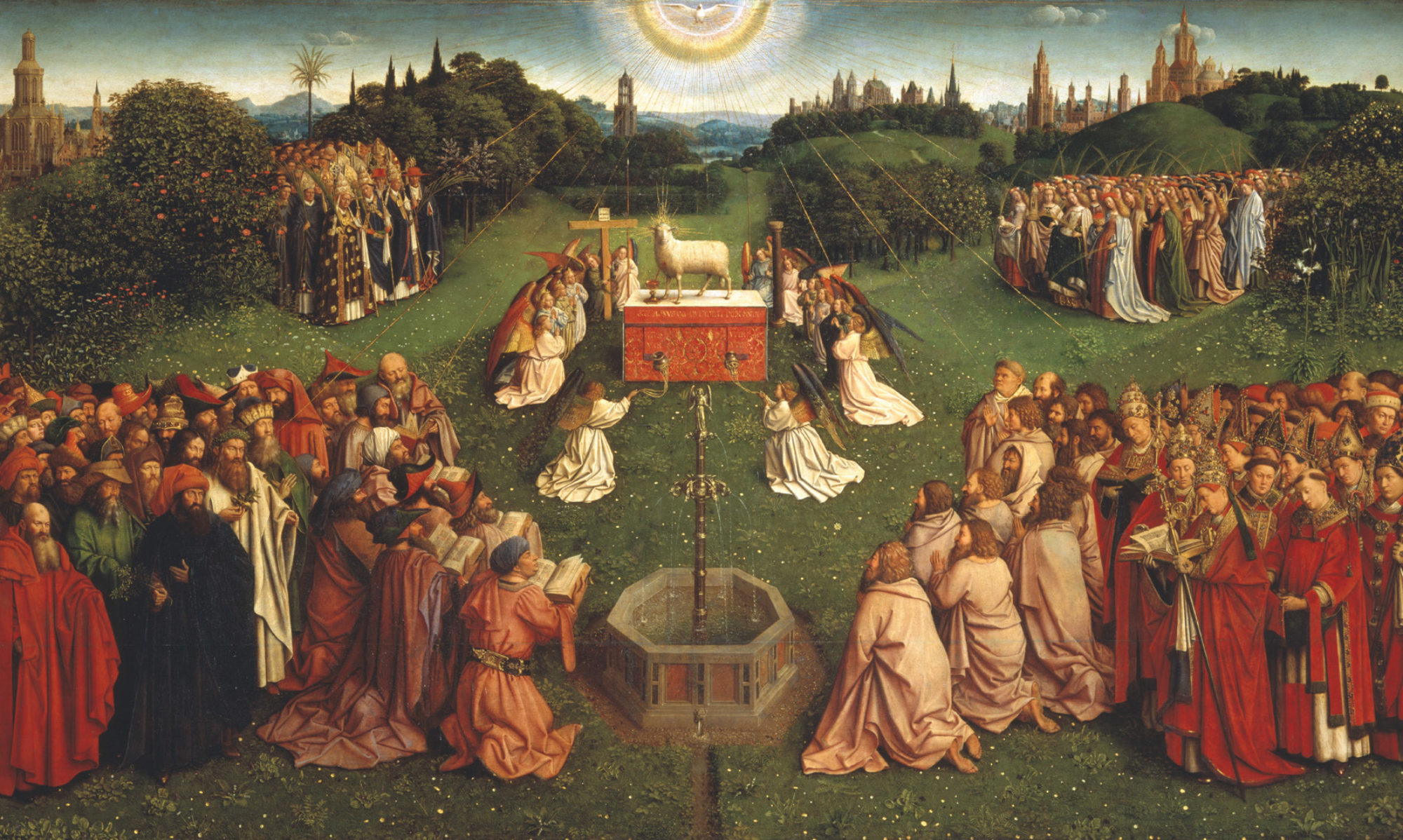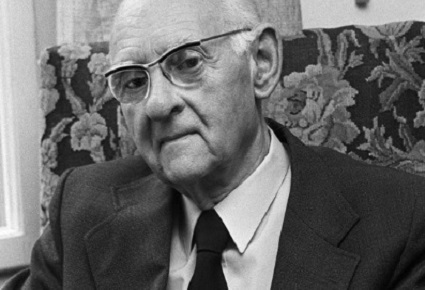The theologian Hans Urs von Balthasar is often promoted as an orthodox answer to the tidal wave of progressive theology inundating the post-Vatican II Church. This is somewhat understandable, as Balthasar vehemently resisted certain progressive trends that sought to reduce Christ to into a mere role model and redefine salvation in merely social terms. Balthasar strongly insisted on a transcendent Catholicism with a central focus on the Person of Christ who saves us, not merely from social injustice, but from our sins. Balthasar’s voluminous writings on the Church Fathers and various aspects of Christian theology earned him a respected place among the post-Conciliar Church’s most notable theologians. His works have been popularized in the English speaking world by Ignatius Press, which is run by Fr. Joseph Fessio, S.J., a disciple and friend of Von Balthasar.
Balthasar has thus become a sort of poster-child theologian for the post-Conciliar, conservative “New Evangelization” wing of the Church. He was the favorite theologian of Joseph Ratzinger and was elevated to the cardinalate by John Paul II, being prevented from entering into his office only by his sudden death in 1988. His status as an orthodox counterweight to progressive theology is profoundly misplaced, however, for Balthasar put forward many opinions that were seriously problematic, if not blatantly heretical. He is most well-known for his hypothesis that Hell may be empty, but some of his other ideas are even more radical. We have written elsewhere of his denial of Christ’s beatific vision; in this essay we shall examine another one of Balthasar’s astonishingly heterodox novelties: that Christ had the virtue of faith, experienced ignorance, and even positive error.
Traditional Catholic Consensus: Christ Did Not Have Faith
It has always been Christian teaching that Christ does not possess the theological virtue of faith. This is because, quite simply, Christ always enjoys the beatific vision. Faith is a virtue proper to those still on their way to heaven, viators. But He has already “arrived”; He is not a viator but a comprehensor, one who comprehends the vision of God. Just as we will no longer possess faith or hope once we have attained beatitude and the consequent fullness of knowledge, so Christ has never possessed it because He has always experienced uninterrupted beatitude and the fullness of knowledge.
St. Thomas Aquinas teaches that Christ could not have had faith. The evidence he cites for this is the very fact that Christ experienced the beatific vision. The vision of God and the act of faith are incompatible, because the act of faith presupposes that one is not seeing God’s essence. Aquinas says:
The object of faith is a Divine thing not seen. Now the habit of virtue, as every other habit, takes its species from the object. Hence, if we deny that the Divine thing was not seen, we exclude the very essence of faith. Now from the first moment of His conception Christ saw God’s Essence fully, as will be made clear. Hence there could be no faith in Him (STh, III, Q. 7 art. 3).
In our prior essay, we demonstrate that Balthasar categorically denies that Christ experienced the beatific vision. His teaching that Christ has faith is the logical consequence of this denial. Conversely, if Christ did experience the beatific vision while on earth (as Catholic Tradition asserts), then Christ could not have possessed the virtue of faith.
Another reason Christ cannot have faith is because faith implies ignorance. It is an ignorance of not knowing God’s will, of not knowing whether or not one’s prayers will be answered in a certain way, of how God is working in a particular situation, and even of whether or not one can be absolutely certain they are doing what God wants in a certain concrete act. All of these things are implied when human beings exercise faith; faith is exercised in response to these shadows of ignorance and forms the bridge that enables man to stay united to God despite them. Thus, if Christ is to have a truly human faith, he must also have the ignorance proper to mankind.

Saying that Christ experienced this sort of ignorance should be extremely problematic for those who understand the traditional Christian concept of the Hypostatic Union. Christ assumes human nature, but without losing any of the prerogatives that belong to His deity. His glory and power are veiled, but they are not negated. Hence He says He can summon ten thousand legions of angels and for a moment on Mount Tabor is able to reveal some of His splendor. The idea that Christ could have positive ignorance is profoundly unchristian and decidedly against Catholic Tradition, both in the East and the West.
It must be mentioned that we are not speaking of the particular facts of the created world that Jesus may have not had human knowledge of because they were not pertinent to His mission (e.g., that Christ may not have known calculus, been able to speak Swahili, or been conversant in HTML). These things are not ignorance in the sense in which we are speaking; it has always been understood that God willed the incarnate Jesus Christ to have only the knowledge of the things pertaining to His mission. We are speaking of the ignorance and incomprehension of the actions of God, the sort of darkness and spiritual ignorance one encounters when exercising the virtue of faith.
Balthasar: Christ Possesses Faith and Ignorance
But for Balthasar, Christ not only possesses faith, but experiences “darkness” and “ignorance.” In fact, Balthasar says this “darkness” and “ignorance” is absolutely essential to His mission. For Balthasar, Christ’s ignorance is what makes His faithful act of sacrifice so meritorious. His love is able to bridge the gap between human nature and God due to a supreme act of faith. This Trinitarian “distance” between Christ and God is immense; it extends even to Christ’s ignorance of His own divine nature, something Balthasar asserts, as we shall see. Its greatest manifestation is at the crucifixion and “abandonment” of Christ by God in Hell, where Balthasar says God’s love and purpose are supremely incomprehensible to Christ, who experiences total abandonment by God in the most profound sense possible (even experiencing the pains of the damned). Thus, though totally separated from God in ignorance and darkness, Christ’s supreme act of faith in God’s purpose grants Him victory over death and bridges the gap between man and God, thus reconciling the human race and becoming the model of faith.
This is problematic on many levels. For one, it is the common teaching of Christian theologians that no theological virtues exist in Hell; even Von Balthasar admits this (1). But the centerpiece of Balthasar’s soteriology is an exercise of faith by Christ while in Hell. Balthasar will argue around this point by suggesting that while Christ and men both have faith, the faith of Christ is qualitatively different from ours. Balthasar believes that Christ experiencing faith and the darkness that comes with it is necessary for His death to be truly representative of humanity. But if His faith is qualitatively different than ours, in what sense is it really representative?
Balthasar’s Seven Arguments
Balthasar puts forward seven arguments in favor of his thesis that Christ had ignorance and faith. Why does he insist so strongly on this point? It is central to his whole Christology, as we shall see.
1. Faith and Ignorance Necessary for the Word to Truly ‘Become Flesh’
Balthasar’s first argument is that If Christ did not assume human ignorance, then the whole Word did not become flesh (2) and the Incarnation would be incomplete. Christ would not have been fully man if He did not assume human faith and ignorance. This relates to Balthasar’s whole theology of the Incarnation and his understanding of how the Word became flesh—the Incarnation is not fully complete unless Christ, like us, experiences ignorance and exercises faith.
2. Christ Must Be Like Us “In All Things But Sin”
Second, Balthasar notes Hebrews 4:15, that says Christ was like us “in all things but sin.” If this were true, He must live in ignorance and darkness of faith. Though like the first argument it differs in that the former is concerned with the entire Person of the Word whereas here he is concerned with what kind of man He becomes. This ignorance is necessary for Christ to identify Himself with humankind and have a true experience of being man (3).
3. Ignorance is Necessary for Obedience
Next Balthasar argues that Christ’s ignorance is necessary for His obedience to be meritorious. According to Balthasar, not knowing is a requisite for meritorious obedience.
4. Necessary Futility
Von Balthasar assumes that it is necessary that Christ experienced not only suffering on the cross but actual futility; i.e., that He must experience a kind of despair, even believing that His mission has failed. Obviously this would be impossible if Christ had a certain knowledge of His ultimate victory. Therefore He must have both faith and experience ignorance.
5. “A Normal Human Life”
Balthasar also states that ignorance is normative in human affairs. A rehash of his second argument, Balthasar asserts that ignorance is necessary if Christ’s life were to be typical, like other man. He states that Christ led “a simple human life with nothing exceptional about is save an ardent love for the Father and for men, a life of work and teaching, ending in poverty and disgrace” (4).
6. Ignorance Necessary to ‘Fashion’ His Mission
Von Balthasar rejects what he calls a “prefabricated” mission of Jesus Christ; Christ did not come into this world with His mission “ready-made” for Him, nor was it knowable through any “’objectivized’ vision” (5). Christ did not come into the world with any sort of innate knowledge of His mission or the Father’s plans for Him, according to Balthasar. How, then, did He gain the necessary knowledge of His identity and mission? Balthasar says “he must fashion [His mission] out of himself in utter freedom and responsibility, indeed, in a sense, he even has to invent it” (6). Obviously, for Christ to “fashion” his mission, to “invent” it and progressively discover His identity, it is necessary that He have positive ignorance with regards to the Father’s plan for Him.
7. Faith is a Perfection
Balthasar’s seventh argument for why Christ had faith and positive ignorance is perhaps the most striking. Whereas he often presents faith as a response and solution to human ignorance, he also presents ignorance and faith as perfections in and of themselves. He says “faith [is] not only an attitude of expectation…it is the definitive messianic attitude itself. It is the co-perfecting of the Messiah’s form of existence” (7). How can ignorance and faith be perfections? If that were the case, then the blessed in heaven would have to possess faith, since the saints in heaven are perfected and faith is a perfection. In fact Balthasar will argue just this, suggesting that ignorance and faith are part of the life of the saints in heaven.
Von Balthasar demonstrates particular contempt for the traditional Thomistic view that the beatific vision consists in a kind of intellectual knowledge of God’s essence. For Balthasar, a fullness of knowledge would rob the beatific vision of its joy. He says:
[An] all-knowing attitude…eviscerates the joys of expectation, of hope and fulfillment, the joys of giving and receiving and the ever deeper joys of finding oneself in the other and of being constantly over-fulfilled by him; and finally—since we are speaking of God—it destroys the possibility of mutual acknowledgement and adoration in the Godhead (8).
This last sentence should be contemplated to appreciate its radical novelty. Balthasar is infamous for his hypothesis of an empty hell and for his bizarre theology of Christ’s descent into hell. But this statement—that God Himself cannot even possess full-knowledge without destroying the possibility of mutual adoration within the Godhead—is far more novel than his other more well-known assertions. Faith and ignorance are necessary even within the Godhead in order to give vitality to the Trinitarian relationships.
We are thus left with a God who wonders at His own nature, a Trinity where “there is no end to being surprised” (9); this mutual act of God being “surprised” at Himself Balthasar refers to as “the primal faith within the Trinity” (10); because Balthasar envisions everything God does in the economy of Creation as being a mirror of His inner Trinitarian life, this “primary faith within the Trinity” becomes the necessary antitype to faith of men, which is a reflection of the Trinitarian “faith.” Since the fundamental characteristic of human faith is a degree of ignorance of God’s designs, God’s fidelity of love within the Trinity also has the same character of faithful ignorance.

Response to Balthasar’s Arguments
To any Catholic steeped in the traditional Christology of the Church, the novelty and danger in Balthasar’s opinions on this matter should be evident. Still, let us revisit his seven arguments and examine where precisely he goes wrong. To do this, we will restate his seven arguments in abbreviated form. His arguments will be presented in italics, with our response to each below.
1. Faith and Ignorance Necessary for the Word to Truly ‘Become Flesh’
If Christ did not assume human ignorance, then the whole Word did not become flesh; the Incarnation would be incomplete. Christ would not have been fully man if He did not assume human faith and ignorance.
This argument is only plausible if one already accepts Balthasar’s theology of the Incarnation. Catholic tradition has always taught that when He became man the Word of God divested Himself of the manifestation and full exercise of His divine prerogatives but maintained their powers; He “emptied” Himself, and “veiled” His glory, but without giving up anything proper to divinity (cf. Php. 2:5-11, Col. 1:15-20). But for Balthasar, this “emptying” means not only giving up of the full exercise of His divine prerogatives, but actually divesting Himself of them in an objective sense. Thus Balthasar’s first argument presupposes accepting another argument; namely, that the Word of God actually divested Himself of His divine attributes, not just “veiling” them but actually giving them up. Only if such a view of the Incarnation is accepted could Balthasar’s first argument hold any merit. It suffices to say that traditional Christology has never posited human ignorance to be necessary for the Word of God to assume human nature.
2. Christ Must Be Like Us “In All Things But Sin”
Hebrews 4:15 says Christ was like us “in all things but sin.” If this were true, Christ must live in ignorance and darkness of faith.
Balthasar confuses fallen and unfallen nature. Ignorance—and hence faith—are proper to man’s fallen nature. But Christ did not assume human nature in its brokenness, but in its wholeness. He assumed human nature in its unfallen state. Balthasar assumes Christ assumed fallen human nature. This is a gross error.
3. Ignorance Necessary for Obedience
Christ’s ignorance is necessary for His obedience to be meritorious. Not knowing is a requisite for meritorious obedience.
Balthasar offers no explanation for why full knowledge robs obedience of its merit, nor does he explain why obedience would not still be the virtue that guided the fulfillment of a task done in full-knowledge. Does a monk asked to bring a pail of water to give drink to the horses obey any less than a monk who is asked to bring water with no explanation? In both cases obedience is exercised and it is meritorious. In this he misunderstands the merit of faith for the merit of obedience; the merit of faith does indeed derive from a sort of not seeing, as Aquinas notes (III, Q. 7, art. 3) but this is not the reason for the merit of obedience. Balthasar fundamentally confuses the two virtues.
4. Necessary Futility
It is necessary that Christ experience not only suffering on the cross but actual futility; i.e., that He must experience despair and even believe that His mission has failed. Therefore He must have both faith and experience ignorance.
Like the first argument, this presupposes another premise—that Christ should have experience futility. If we do not grant that Christ should have experienced futility, the force of this argument vanishes. Note also that the logical conclusion of Balthasar’s teaching that Christ experienced futility: Futility for Balthasar means Christ died in the belief that His mission had failed; this means Christ’s ignorance was not a simple lack of knowledge, but actual error.
5. “A Normal Human Life”
Ignorance is normative in human affairs. Ignorance is necessary if Christ’s life were to be typical; Christ led “a simple human life with nothing exceptional about is save an ardent love for the Father and for men, a life of work and teaching, ending in poverty and disgrace”
Christ’s life was not “typical”; and if Balthasar says there was “nothing exceptional” about it other than the degree of His love, one must wonder what about the miracles, the casting out of demons, and all the other manifestations of supernatural power? Also, recall that Balthasar, while acknowledging that Christ has faith, tries to buffer himself from the obvious implications of his teaching by stating that Christ’s faith is qualitatively different than the faith of men. If this is the case, how can it be emphasized that Christ’s faith “typical” or “normal” when it was qualitatively different than that of other men?
6. Ignorance Necessary to ‘Fashion’ His Mission
Christ did not come into the world with any sort of innate knowledge of His mission or the Father’s plans for Him, according to Balthasar. In order to “fashion” his mission, to “invent” it, Christ had to progressively discover His identity. Thus it is necessary that He have positive ignorance with regards to the Father’s plan for Him.
It is not evident how Jesus’ uncertainty as to His Father’s mission can be reconciled with Jesus’ acceptance of His sufferings in the understanding that they are clearly, unmistakably, and inerrantly willed by the Father for the salvation of mankind. We should also note that the idea of a Christ who has to “discover” His identity or “invent” His mission for Himself as He goes is absolutely repugnant to the Christian tradition, which always presents Christ as receiving knowledge of His teaching, identity, and mission directly from God. “Everything I have received form my Father I have made known to you” (John 16:27); “The words which you gave me, I have given them” (John 17:8); “No one takes my life from me, but I lay it down of my own accord. I have authority to lay it down and authority to take it up again. This command I received from my Father” (John 10:18).
7. Faith is a Perfection
Faith and ignorance are perfections. They are found even within the life of the Trinity and are actually necessary for the Trinitarian relations to sufficiently love one another. Human faith mirrors divine faith. The idea of faith as an imperfection is profoundly misguided.
Many theological arguments could be militated against this, but it is perhaps best to return to the simple teaching of St. Paul in 1 Corinthians 13. Faith is the state proper to those who do not yet see God; faith and the sight of God are opposed to one another:
We know in part, and we prophesy in part. But when that which is perfect is come, that which is in part shall be done away. When I was a child, I spoke as a child, I understood as a child, I thought as a child. But, when I became a man, I put away the things of a child. We see now through a glass in a dark manner; but then face to face. Now I know in part; but then I shall know even as I am known (1 Cor. 13:9-12).
Faith is for viators, those who are journeying on towards God but have not reached their eternal destiny. When a viator reaches his eternal destination, he becomes a comprehensor, one who no longer apprehends by faith, but who knows by direct vision. This is why faith terminates in heaven and why Balthasar’s assertion that not only Christ but the saints and even the Trinity exercise faith is so horribly misguided.
It also must be asked whether this theory would lead to a kind of process theology, where God is constantly discovering Himself. Frankly, this idea of God being “surprised” at Himself implies that God can grow in His divinity. The divine knowledge is identical with the divine essence; the surprise of one Person of the Trinity by another thus means the one surprised grows in knowledge of what the other is; hence He grows in knowledge of what it is to be God, and hence grows in divinity itself. God’s immutability and His very perfection are called into question. God cannot be a “God of surprises.”

Conclusion
Because of the Hypostatic Union, Jesus Christ is fully God and fully man. This union of the two natures means that, though fully man, Jesus also experienced the beatific vision continually. The beatific vision means Christ was continuously experiencing the intellectual vision of God. As such, He cannot have the virtue of faith, which is proper to those who do not yet see God but are on their way towards Him. Because He lacked faith, He also lacked the darkness of ignorance that is proper to faith. This all flows from Christ’s possession of the beatific vision, which in turn is implied by the Hypostatic Union itself. Von Balthasar’s assertion that Christ did not possess the beatific vision leads him to assert that Christ had the virtue of faith, as well as the ignorance that comes with faith— and, as we have seen, in some cases even that Christ positively erred in certain matters of belief (for example, dying in the belief His mission was a failure). This leads to even more absurdities, such as positing faith within the Godhead, where each Person of the Trinity is continually “surprised” by the others, hence calling into question the immutability of the divine essence.
Rather than affirm all these heresies, so scandalous to pious ears, let us hold fast to the traditional teaching, explained by Aquinas, that Christ did not have faith or ignorance because of His constant experience of the beatific vision.
I am indebted to the book Light in the Darkness by Alyssa Lyra Pitstick, where the sources and structure of this argument were taken from. This book, though dense, is highly recommended for anyone who wants to truly understand what a heterodox theologian Hans Urs Von Balthasar was.
All titles by Hans Urs Von Balthasar
(1) “The Descent into Hell”, Explorations in Theology, Vol. IV, pg. 408
(2) “The New Covenant,” Vol. VII, The Glory of the Lord, pp. 143-44
(3) Does Jesus Know Us—Do We Know Him? (Ignatius Press, 1983), p. 23
(4) “The Word Made Flesh”, Explorations in Theology, Vol. I, “God Speaks As Man”, pg. 93
(5) The Dramatis Personae: The Person in Christ, vol. III, Theo-Drama, pg. 167, 198
(6) Ibid., 198
(7) “Fides Christi: An Essay on the Consciousness of Christ”, Explorations in Theology, Vol. II, pg. 74
(8) Dramatis Personae: Man in God, vol. II, Theo-Drama, pg. 257
(9) Ibid., 258
(10) Ibid., 287
Phillip Campbell, “Balthasar and the Faith of Christ,” Unam Sanctam Catholicam, October 5, 2015. Available online at: http://www.unamsanctamcatholicam.com/balthasar-and-the-faith-of-christ

